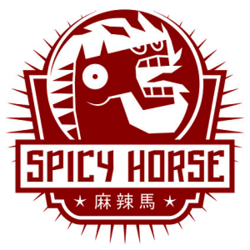Spicy Horse
 |
|
| Private | |
| Industry | Computer and video game industry |
| Founded | 2007 |
| Founder |
American McGee Anthony Jacobson Adam Lang |
| Defunct | 2016 |
| Headquarters | Shanghai, China |
|
Area served
|
Worldwide |
|
Key people
|
American McGee Ken Wong R. J. Berg |
| Products | Video games |
|
Number of employees
|
6 |
| Website | www.spicyhorse.com |
Spicy Horse (simplified Chinese: 麻辣马; traditional Chinese: 麻辣馬; pinyin: Má là mǎ) was a Shanghai-based independent video game developer started by American McGee, Anthony Jacobson, and Adam Lang in 2007. It was announced on July 23, 2016 that the company is closing its doors to focus on smaller indie development.
The studio was established in 2007. It was called a studio "leading the way" in episodic games. It was the largest independent Western developer in China.
Spicy Horse employed more than 70 people at their studio in Zhabei District, Shanghai. The company's development process utilizeed a "core team" methodology and 100% outsourced art asset production to conserve energy directed at the core competencies of game development.
Following rumors regarding the studio's closure, on March 29, 2016 McGee acknowledged that there had been some layoffs but they will continue to operate and will look to move away from F2P mobile games in the future.
In 2016, McGee announced the closure of Spicy Horse after 10 years of development. He plans to focus on indie development using Patreon and work on a different work environment like his sailboat.
Their first title, American McGee's Grimm, was released on GameTap in July 2008 in an episodic form and ran through March 2009. It was built using Epic's Unreal Engine 3.
Spicy Horse developed the sequel to American McGee's Alice for Electronic Arts, titled Alice: Madness Returns. It is the first console game entirely designed and developed in China for export.
...
Wikipedia
